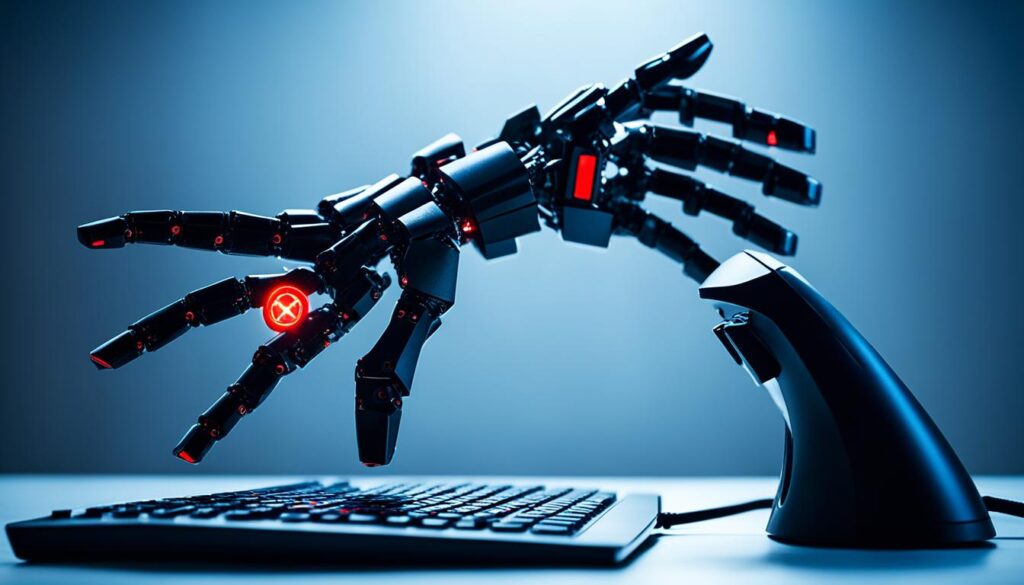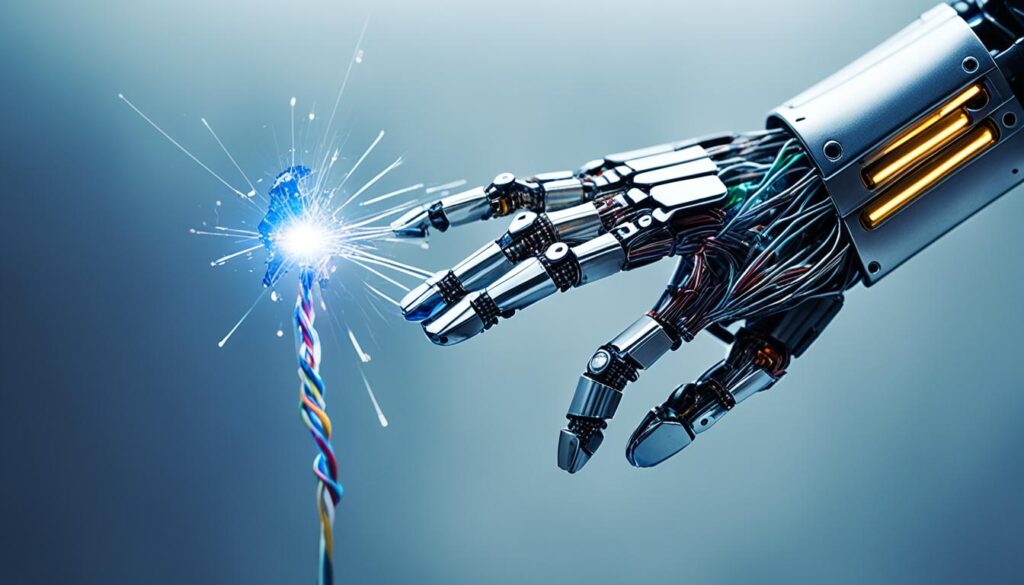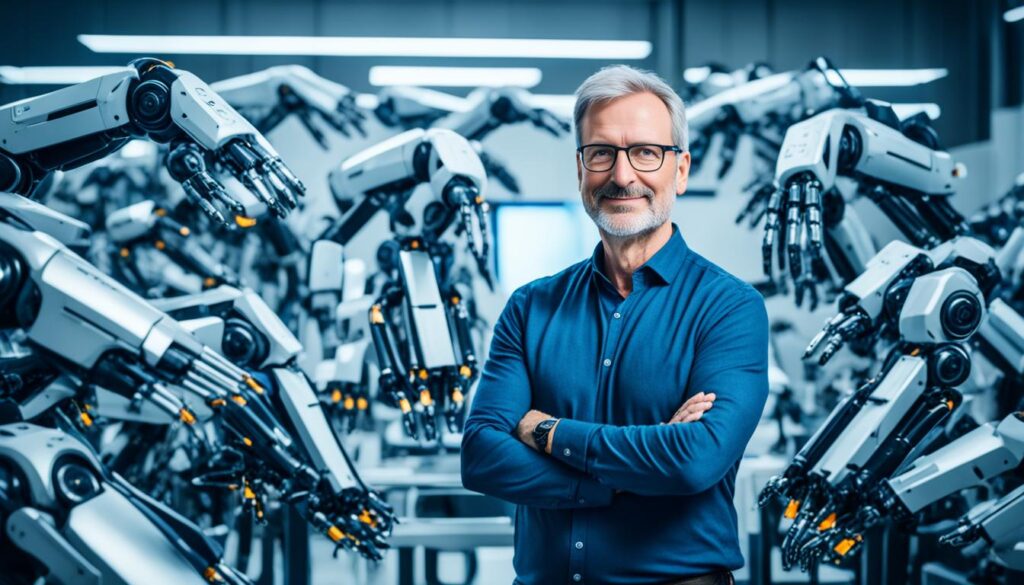Artificial intelligence (AI) is getting better at a really fast pace. For middle-aged folks, this brings a big challenge. The tech that’s changing our world might also mess with your job and money. So, what’s the deal and how can you be ready for what AI is bringing?
Let’s talk about five major ways AI might change your life. These changes could be bigger than you think.
Embracing the AI Revolution: A Wake-Up Call
The AI revolution is here. It is crucial for middle-aged Americans to adapt quickly. Artificial intelligence (AI) brings exciting chances for more efficiency and productivity. But, it also carries risks. These risks should not be overlooked.
AI’s Rapid Advancement: Keeping Up or Left Behind?
The speed at which AI technology is advancing is incredible. This has clear implications for the job market. AI job displacement is becoming a real worry. Now, machines and algorithms do tasks that only humans used to. Middle-aged folks need to learn new skills and keep up with the latest. This is key to staying ahead in their careers.
The Promise and Perils of Technological Progress
The idea of AI technological singularity is fascinating yet worrying. It’s the point when tech grows so fast, it changes everything. While AI offers huge benefits like better healthcare and more productivity, it also brings risks. Middle-aged Americans need to truly understand how these quick tech changes might affect them. This knowledge is vital for their future.
AI Job Displacement: Protecting Your Career
Artificial intelligence (AI) is getting better and poses a threat to jobs for those in the middle of their careers. Many jobs, like working in a factory or driving a truck, may soon be done by machines. This makes middle-aged workers worry about losing their jobs. But, there is hope. There are steps you can take to help keep your job safe from AI’s big changes.
It’s important to keep up with the latest AI news. Knowing how AI might affect your job can help you get ready. You might need to learn new skills, like working with data or coding. Or you could focus on improving skills like solving problems or thinking critically. These are things that machines will have a hard time doing for a while.
Making and keeping friends in your field is also key. Connecting with people who do what you do, as well as with mentors and people who might want to hire you, can lead to new job chances. Networking helps you spot trends early and can help you find new jobs if yours gets taken by a machine.
Think about learning new things and looking into fields that might not be as affected by AI. By being good at more than one thing, you make yourself more valuable. This makes you stand out to employers looking for someone who can do many jobs well.
Dealing with AI taking jobs needs steady work and being ready to learn all the time. By staying on top of technology, improving your skills, and making strong connections, you can push through. Middle-aged Americans, don’t let the fear of technology change stop you from staying in the workforce.
Privacy Concerns: The Erosion of Personal Data
Today, fast *artificial intelligence (AI)* changes our online world. Gathering personal data worries many middle-aged Americans. *AI* algorithms hunger for data. They collect and analyze heaps of our info. Often, we don’t know or agree.
AI’s Insatiable Appetite for Data
*AI* shines in understanding big data, including our browsing, social media use, and biometric data. This approach changes how businesses work. But, it also worries many people about their privacy.
Safeguarding Your Digital Footprint
In our digital era, middle-aged adults must work to keep their data safe. By learning about *AI*’s privacy effects and protecting their online lives, they can avoid identity theft and unwanted attention.
Be smart about your privacy settings on social media. Think twice before sharing personal info. Middle-aged Americans can manage their digital life well. By being alert and taking steps, they can handle the challenges of *AI* and keep their data safe.
5 things about AI that should scare middle aged people
As artificial intelligence (AI) grows, certain changes should concern middle-aged Americans. These shifts touch on job safety, privacy issues, and other vital points. Let’s look at five reasons these changes should catch the attention of people over 40.
The possibility of losing jobs to AI is a major worry. Middle-aged professionals may face job losses due to automation and AI. Their well-established careers might be at risk, demanding they find new paths.
The loss of personal privacy to AI’s data needs is also alarming. Sophisticated AI tech collects and studies personal data. This can put middle-aged folks’ private information out in the open, shaking their confidence in data security.
The risk of unfair treatment through algorithmic bias is another concern. Hidden biases in AI systems could harm job hunts or loan applications for middle-aged individuals. This bias may not be obvious, making it a challenge to address.
A different issue comes from the cybersecurity risks linked to AI threats. As AI improves in spotting weak points, cyber threats become more dangerous. Middle-aged individuals might find themselves easy targets, risking their personal and financial details.
Finally, the idea of a “technological singularity” should make anyone pause. This is when technology grows so fast it leads to immense, unpredictable changes in society. The futurist view of this event can be deeply unsettling for many.
AI Decision-Making Bias: Uncovering Hidden Prejudices
AI decision-making is on the rise, but it’s important to note these systems can have biases. They may reflect the prejudices of the people who make them. This can lead to unfair outcomes for many, especially those in middle-age.
Algorithmic Fairness: A Crucial Consideration
Nowadays, AI is making more decisions that shape our lives, like who gets a job or a loan. But, these decisions might not always be fair. If the algorithms aren’t built to be just, they could actually make biases worse. This ai decision-making bias might show itself by favoring some groups or using outdated data.
That’s why the idea of “algorithmic fairness” is becoming more important. It means making sure AI decisions are clear, just, and without biases. By tackling ai decision-making bias, we aim for systems that work better for everyone, not just some, including those in middle-age.
AI’s impact keeps growing, which means it’s crucial to spot and deal with hidden prejudices in these technologies. We need to understand ai decision-making bias better to make AI truly beneficial for everyone, especially those in their middle years.
Cybersecurity Risks: Defending Against AI-Powered Threats
The use of AI in cybersecurity is on the rise. This means middle-aged Americans should understand the new risks. While AI tools can boost security, they also open the door to more complex attacks.
The Double-Edged Sword of AI in Cybersecurity
AI systems are great at sorting through tons of data to spot threats fast. This helps fight off cyber attacks effectively. But, these same systems can be misused by hackers. They can automate and ramp up the sophistication of their attacks.
Take AI-powered malware. It can change itself to slip past regular security checks. And AI-driven phishing attacks can look more real to trick people better. Those who aren’t too familiar with tech, like many middle-aged individuals, could fall prey easier.

To stay safe, middle-aged Americans should keep up with AI cybersecurity threats. They should also up their security game. This means using tough passwords and turning on two-factor authentication. Being careful with what links or files you click on is also crucial.
The Technological Singularity: Pondering the Unknown
The ai technological singularity has been a big topic among middle-aged Americans for a while. They worry about a point in time when machines could be smarter than us and hard to control. With ai tech getting better every day, many think about what might happen next.
The singularity is like a door to a future where technology changes really fast and in big ways. Once we cross this line, predicting the future gets almost impossible. Imagine if super smart ai systems change our world in ways we can’t even understand. People argue a lot over what this change could mean, good or bad.
Imagine if you’re middle-aged and the thought of the ai technological singularity. You’re dealing with your job, home life, and a world that’s always changing. The idea that machines might one day outsmart us is very scary. It shows why folks in this age group need to be active in making sure ai is used in the right way.
Ethical Considerations: Navigating AI’s Moral Dilemmas
AI is more part of our lives than ever before. This makes us think a lot about its ethics. We will look into dilemmas like bias and privacy, and how AI can affect decisions. It’s important for everyone, from individuals to tech companies, to make sure AI is used right.
Responsible AI Development: A Shared Responsibility
The fast growth of AI comes with good things and tough questions. We need to think about the ethics as it becomes more common. The duty to do this is for the companies behind AI and also for those who use it.
Bias is a big issue with AI. It learns from data, meaning if there are unfair biases in that data, AI can make things worse. For example, it could make unfair choices in hiring or criminal justice. Everyone, from developers to policy makers, must work together to make sure algorithms are fair and inclusive.
Thinking about privacy is also important with AI. It uses lots of data, which can threaten our privacy. It’s a tricky line to balance using data for good without violating privacy.
To do AI right, we all need to work together. Developers should make AI with ethics in mind, like being clear and protecting rights. Policy makers must make rules to guide AI use and make companies follow them. In the end, using AI well and ethically is up to everyone.

Conclusion: Embracing AI with Caution and Wisdom
The AI revolution is rolling on, and middle-aged Americans need to have a clear view of it. AI can boost our work, make things smoother, and open doors we never saw before. But, we must also remember the serious dangers it brings. This includes losing jobs, privacy issues, cyber threats, and questions about what’s right and wrong.
Getting the wrong information from AI and being tricked into feeling a certain way are big worries. So, we need to get better at spotting false news and thinking hard about what we see and hear.
It’s crucial to be up-to-date about AI, push for it to be used the right way, and protect ourselves. Knowing the good and bad sides of AI helps us use it wisely. Let’s welcome AI changes but be smart and careful about it. This is how we can make sure AI matches our values and keeps our society safe and sound.
